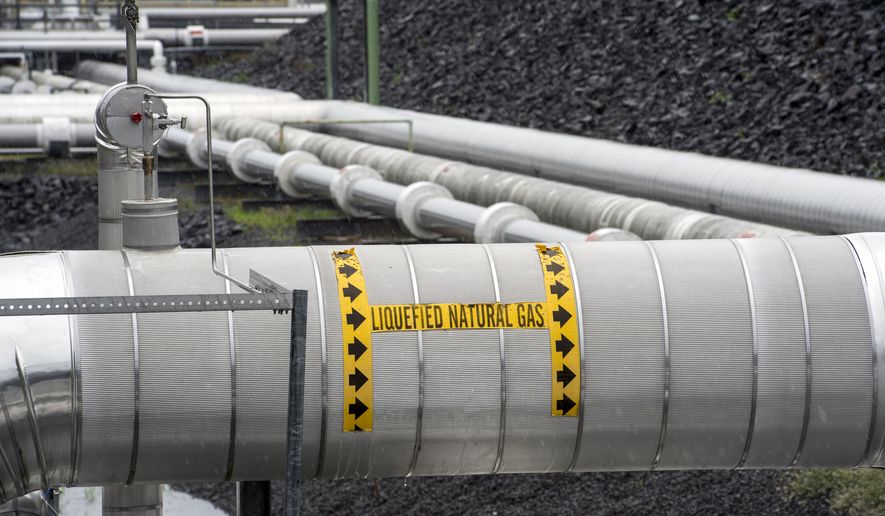The Obama administration is warming up increasingly to U.S. exports of natural gas after years of blocking greater access by domestic producers to the international market.
Tucked inside the White House’s latest economic report to Congress is a section on energy production, with President Obama’s top economic advisers embracing the concept of boosting natural gas exports as a driver of job growth, even as it would likely drive up prices paid by U.S. consumers and businesses.
“An increase in U.S. exports of natural gas, and the resulting price changes, would have a number of mostly beneficial effects on natural gas producers, employment, U.S. geopolitical security, and the environment,” the report said.
A spokesman for energy producers said the change in attitude would be welcome if the administration backs up its words with positive action.
“Every major study, including those from the Energy Department, has shown that U.S. natural gas exports will create more jobs, strengthen our security and grow the economy,” said Zachary Cikanek of the American Petroleum Institute. “The concern is with the administration’s inaction — not its words. There is no reason to delay any permit, but dozens still await action while our competitors overseas push ahead. This is an incredibly important opportunity for the U.S. economy, and we’re hopeful that [Energy] Secretary [Ernest] Moniz and leaders in Congress can work together to accelerate the process.”
Current law requires the expedited approval of natural gas exports to any country with which the U.S. has a free trade agreement. But exports to non-free-trade countries require lengthy reviews by the Department of Energy and other federal agencies.
As of Dec. 31 the Energy Department had given final approval to five liquefied natural gas export proposals. It has given conditional approval to four others — including the proposed Dominion Cove facility in Lusby, Maryland — pending environmental studies and other federal reviews.
But nearly 30 other applications remain outstanding. In making each decision, the department weighs whether the projects are in the national interest of the U.S. Factors considered include “the economic, energy security and environmental impacts” the project would have on the U.S., the Energy Department said.
Meanwhile, the Republican-controlled House has moved legislation to speed up the process.
Last month the House approved a bill that would require the Department of Energy to make a decision on natural gas export projects within 30 days of the completion of federal environmental reviews.
Forty-one Democrats voted in favor of the measure.
“We’re now the world’s largest producer of natural gas, and because we have become so efficient at producing this resource, we have an excess supply we can sell to our allies across the globe,” Rep. Bill Johnson, Ohio Republican and sponsor of the bill, said last month.
The president’s economic team said increasing U.S. exports would:
• Spur even greater domestic production by raising prices.
• Create more jobs in the short run — as many as 65,000 per year.
• Result in a “positive geopolitical impact” for the U.S. around the globe by lowering natural gas prices abroad.
• Promote cleaner energy in countries that now rely on coal, thereby helping to combat climate change.
The downside — increases in domestic prices — would hit hardest “the most intensive users, such as producers of flat glass or nitrogen fertilizers,” the report said.
“But these gas-intensive industries represent only a small share of total manufacturing employment and output,” the White House said. “In particular, the top 15 gas-intensive industries account for only 2 percent of total manufacturing employment and 3 percent of manufacturing value added. Businesses with very thin profit margins may also be adversely affected.”
Over the past decade, U.S. natural gas production has exploded thanks to the discovery of new deposits such as the Marcellus Shale and the perfection of drilling techniques such as fracking.
The U.S. now is the world’s No. 1 producer of natural gas, according to government data. Last year, the U.S. produced more than 74 billion cubic feet of natural gas each day, Energy Information Administration data show. Global natural-gas production also hit an all-time high of 328 billion cubic feet per day in 2013, according to industry figures.
As a result of the skyrocketing production, exporting natural gas now is seen as a potential economic boon, but export projects face significant red tape in the federal government.
Environmental groups vehemently oppose such export projects, arguing they threaten water, air and habitat in the U.S. and would contribute to climate change by facilitating the burning of fossil fuels abroad.
A coalition of environmental groups recently blasted the proposed Jordan Cove export project, which would be constructed on the Oregon coast and has received conditional Department of Energy approval pending an environmental review.
“It’s time we left fossil fuels in the past and turn toward a robust economy of clean energy that creates more jobs than big oil and gas for the same level of investment,” Lesley Adams, western regional coordinator for the Waterkeeper Alliance, said earlier this month, explaining why her group opposes the project.
Sen. Ron Wyden, Oregon Democrat, backs Jordan Cove, though he also has urged the Energy Department to keep a close eye on gas exports to ensure they don’t decrease supply and drive up prices in the U.S.
“Priority one for me has always been ensuring American jobs and employers see the full benefits of the natural gas renaissance,” he said last year after the project received conditional approval. “The Department of Energy must monitor markets closely and be prepared to adjust course should any threat to American jobs or energy security emerge.”
The Federal Energy Regulatory Commission now is conducting an environmental review of the project.
• Dave Boyer can be reached at dboyer@washingtontimes.com.
• Ben Wolfgang can be reached at bwolfgang@washingtontimes.com.




Please read our comment policy before commenting.